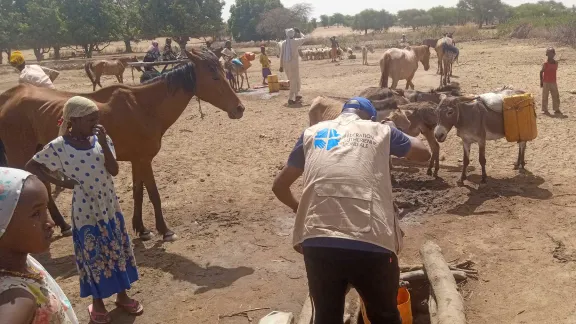LWF continues to provide humanitarian aid to Sudanese refugees in Chad. Many are severely wounded and have travelled far in search of safety. LWF and partners are calling for more funding to care for the people in need.

LWF talks with women on water related diseases in Ambilia Site. Photo: LWF/ F. Djamal
LWF continues response to Sudan crisis, needs are overwhelming
(LWI) - Water, sanitation, shelter and food: LWF in Chad continues to provide humanitarian aid to refugees fleeing the violence in Sudan. Since the beginning of the Sudanese conflict in April 2023, between 5,000 and 8,000 people have been killed. The newly arriving refugees report killings and violence in Western Darfur.
“Around 2000 refugees arrive every day, says Clovis Mwambutsa, LWF Regional Program Coordinator for Central Africa. “There are more and more injured people coming, who just escaped death. Some have traveled more than 400 kilometers , from the Darfur region. The situation is terrible, and there is no end in sight.”
The United Nations estimate that 2.7 million people have been forcibly displaced, and 200,000 have fled to Chad, many of them women and children. In a statement on 15 August 2023, the principals of the Inter-Agency Standing Committee (IASC) asked in strong words to end the “tragedy” in Sudan: “People have witnessed their loved ones gunned down. Women and girls have been sexually assaulted. Families have seen their possessions looted and their homes burnt to the ground. People are dying because they cannot access health care services and medicine. And now, because of the war, Sudan’s children are wasting away for lack of food and nutrition,” the statement reads.
I left my village leaving behind everything I had. Many people from my village were killed including my family members. On the way to the border to Chad, people stole everything we had in our hands. Many women were harassed.
Fatiya Hassan HAROUN, refugee from Sudan
The refugees whom LWF receives have experienced terrible things. “I left my village leaving behind everything I had. Many people from my village were killed including my family members. On the way to the border to reach Chad, people stole everything we had in our hands. Many women were harassed,” Fatiya Hassan Haroun from Sudan recounts. “Here, access to water is difficult. There is always a long queue. We spend 3-4 hours queuing for water.”
Given the prevailing instability and the persistence of intercommunity clashes in Sudan, a total of 300,000 refugees are now expected to arrive in Chad by the end of 2023 according to projections by the United Nations refugee agency UNHCR.
Response underfunded
LWF is working in two provinces: Ouaddai and Sila. As the number of refugees and needs are higher in Ouaddai province, LWF has concentrated its relief work there, focusing especially on water and sanitation supported by hygiene campaigns and households' essential items distributions.
“We have drilled boreholes to provide 2,000 persons with drinking water, distributed relief goods and constructed 300 toilets”, says Mwambutsa. Together with the United Nations World Food Program, LWF is now starting to distribute food in the Sila province and planning shelter in designated permanent refugee sites together with UNHCR. “Our initial response was targeting 20,000 persons, but we have revised it to serve twice as many people”, Mwambutsa adds.
However, the response to the emergency in Chad is only funded to 15 percent, making the humanitarians’ work very challenging. Large numbers of refugees in a region marked by poverty and climate change also lead to tensions with local communities and refugees who arrived in previous years. The security situation is tense, making the work difficult and stressful.
The rainy season, which begins in August, is an additional challenge, says Myriam Valme Joseph, LWF Country Representative in Chad. “We try to finish distributions before that, because soon seasonal rivers will make access even more difficult.”
LWF’s work in Chad is supported by Canadian Lutheran World Relief, DLGA/ELDA, Diakonie Katastrophenhilfe, The German National Committee, The Evangelical Lutheran Church in America, The Evangelical Lutheran Church of Wurttemberg, UNICEF and ACT Alliance.


